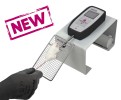Authors
Oguro A, Fujiyama T, Ishihara Y, Kataoka C, Yamamoto M, Eto K, Komohara Y, Imaoka S, Sakuragi T, et al
Lab
Hiroshima University, Hiroshima, Japan
Journal
J Lipid Res.
Abstract
Although pregnant women's fish consumption is beneficial for the brain development of the fetus due to the DHA in fish, seafood also contains methylmercury (MeHg), which adversely affects fetal brain development. Epidemiological studies suggest that high DHA levels in pregnant women's sera may protect the fetal brain from MeHg-induced neurotoxicity, but the underlying mechanism is unknown. Our earlier study revealed that DHA and its metabolite 19,20-dihydroxydocosapentaenoic acid (19,20-DHDP) produced by cytochrome P450s (P450s) and soluble epoxide hydrolase (sEH) can suppress MeHg-induced cytotoxicity in mouse primary neuronal cells. In the present study, DHA supplementation to pregnant mice suppressed MeHg-induced impairments of pups' body weight, grip strength, motor function, and short-term memory. DHA supplementation also suppressed MeHg-induced oxidative stress and the decrease in the number of subplate neurons in the cerebral cortex of the pups. DHA supplementation to dams significantly increased the DHA metabolites 19,20-epoxydocosapentaenoic acid (19,20-EDP) and 19,20-DHDP as well as DHA itself in the fetal and infant brains, although the expression levels of P450s and sEH were low in the fetal brain and liver. DHA metabolites were detected in the mouse breast milk and in human umbilical cord blood, indicating the active transfer of DHA metabolites from dams to pups. These results demonstrate that DHA supplementation increased DHA and its metabolites in the mouse pup brain and alleviated the effects of MeHg on fetal brain development. Pregnant women's intake of fish containing high levels of DHA (or DHA supplementation) may help prevent MeHg-induced neurotoxicity in the fetus.
BIOSEB Instruments Used:
Grip strength test (BIO-GS4)

 Douleur - Allodynie/Hyperalgésie Thermique
Douleur - Allodynie/Hyperalgésie Thermique Douleur - Spontanée - Déficit de Posture
Douleur - Spontanée - Déficit de Posture Douleur - Allodynie/Hyperalgésie Mécanique
Douleur - Allodynie/Hyperalgésie Mécanique Apprentissage/Mémoire - Attention - Addiction
Apprentissage/Mémoire - Attention - Addiction Physiologie & Recherche Respiratoire
Physiologie & Recherche Respiratoire
 Douleur
Douleur Système Nerveux Central (SNC)
Système Nerveux Central (SNC)  Neurodégénérescence
Neurodégénérescence Système sensoriel
Système sensoriel Système moteur
Système moteur Troubles de l'humeur
Troubles de l'humeur Autres pathologies
Autres pathologies Système musculaire
Système musculaire Articulations
Articulations Métabolisme
Métabolisme Thématiques transversales
Thématiques transversales SFN2024: Venez rencontrer notre équipe sur le stand 876 à Chicago
SFN2024: Venez rencontrer notre équipe sur le stand 876 à Chicago 